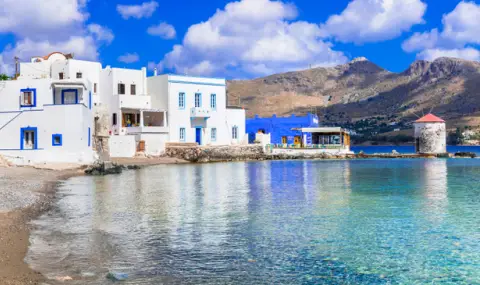Greece's relations with Turkey have always been difficult and often contradictory. Turkey is usually seen as an unpredictable and aggressive neighbor from which Greece must defend itself. That is why Athens spends more than three percent of its gross domestic product (GDP) on armaments. At the same time, however, Turks are welcome as tourists and investors – especially when they spend their money on the islands in the eastern Aegean Sea, i.e. in the strait between Greece and Turkey.
Increase in Turkish investments
The influx to the small island of Leros off the Turkish coast is huge. Until 20 years ago, it had a dark reputation as the location of one of the worst psychiatric clinics in Europe. Today, however, it is a paradise for tourists from Turkey. From Turgutreis in Turkey, near Bodrum, the island is only an hour away by ferry. From Piraeus, on the other hand, it takes almost ten hours, which is why hundreds of Turks come to Leros every summer day, some of whom have even bought a holiday home on the island. The locals eagerly await the wealthy visitors from across the Aegean Sea who appreciate the good food and drink.
The situation is similar on Lesbos, Chios and Samos. Since the simplified tourist visa program for the ten islands came into force (which was agreed after the Mitsotakis-Erdogan meeting in Athens at the end of 2023), Turkish tourists have been increasing. And not only in the summer. Turkish investment in Greece is also increasing. At their current volume of 548 million US dollars (in 2024), they are still limited, but according to the Turkish Central Bank, they have increased tenfold since 2022.
Turks invest mainly in real estate, as this allows them to acquire the so-called “golden visa“, which gives them the right to settle in Greece for five years and move freely within the Schengen area. In 2024, a total of 9,289 applications for residence under the “golden visa“ were submitted, of which 1,356 were from Turkish citizens.
Prices have risen sharply
This program has helped many wealthy citizens of non-EU countries gain access to Greece and the Community. At the same time, however, it led to a sharp rise in property prices, especially in Athens and Thessaloniki, making it difficult for the Greek middle class to find affordable housing. The same happened in Spain, which is why the government in Madrid recently abandoned the “Golden Visa” program. The government in Athens, on the other hand, is sticking to this growth program, but is gradually increasing the minimum investment threshold required.
Initially, foreign investors had to invest at least 250,000 euros in the purchase of a property in order to obtain a five-year residence permit in Greece. Then, at the beginning of 2023, the threshold was raised to 400,000 euros, but only in Athens, Thessaloniki, Mykonos and Santorini, while in other cases the threshold of a quarter of a million euros remained. And from September 1, 2024 the new minimum investment threshold is 800,000 euros for the entire region of Attica, Thessaloniki, Mykonos, Santorini and islands with over 3,100 inhabitants. For the rest of the country, the threshold is set at 400,000 euros.
Despite these increases in amounts, demand remains high from Chinese, Americans, Russians, Israelis and Turks. There are still enough Turkish citizens who can afford to buy property in Greece, and this has recently caused concern among some conservative citizens and politicians. Especially if the properties purchased by Turks are located in Thrace or on the islands of the Eastern Aegean.
Concerns in Greece
This issue is now being used as a political tool by the ruling party „New Democracy“ (ND). A number of MPs, mainly from the traditional right, are dissatisfied with the policy of Prime Minister Kyriakos Mitsotakis towards Turkey. They believe that he is too well-intentioned towards Turkish President Recep Tayyip Erdogan and are demanding more firmness.
Furthermore, far-right parties are gaining ground, which is why conservative politicians from the “New Democracy“ are trying to present themselves as even more ardent patriots. At the end of March 2025, for example, eleven ND MPs asked in parliament what is happening with the “aggressive property purchases“ by people of Turkish origin. They asked all competent ministries to register the total volume of these property purchases in Thrace, Lesbos, Lemnos, Chios and the Dodecanese.
Some members of the public also fear that there may be Turkish spies or mafia members among the buyers. There has been no confirmation of this so far. However, according to information from government circles, some property purchases are currently being checked by the Greek secret services.
Exaggerated fears
In reality, fears of "aggressive property buying" seem exaggerated. Many of the new Turkish owners of the islands in question are wealthy, secular people who have had to leave Turkey.
Many of the buyers of relatively cheap properties in Thrace, in the border region with Turkey, are Muslims of Turkish origin with European citizenship who have long worked in Germany, Belgium or northern Europe. They do not want to remain in Turkey with its increasingly repressive political and religious regime after retirement, but rather want to be in the EU, but also close to their homeland.
